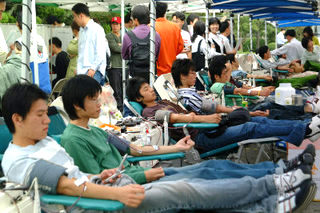 |
If given to pregnant women, could cause birth defects
Blood that could cause birth defects if given to pregnant women was used at hospitals for the treatment of nearly 4,000 patients, according to a report. The blood had come from donors that had taken acitretin, a form of vitamin A used to treat psoriasis and other skin ailments. The report, compiled by Jeon Jae-hee, a lawmaker in the main opposition Grand National Party, said that since 2003, 3, 980 patients had received the blood, which may have been tainted with acitretin. Acitretin can cause birth defects if administered to pregnant women. Health authorities in South Korea and the United States prohibit expecting women from using the drug at least three years prior to pregnancy. South Korean law also bans those who have ever taken the drug from donating blood.However, lax enforcement of the law has left many pregnant women vulnerable to exposure to the drug. Among 251,861 people who had taken the drug more than once between 2003 and July 2005, 1,285 had donated blood. The blood was later transfused to a total of 3,980 patients, the report said. "Of 2,947 [blood donation recipients] whose identity was verified, 1,278 were female and 360 were between 15 and 44," or in the middle of childbearing age, Rep. Jeon said. She expressed worry that blood transfusion recipients could see serious birth defects should they have children soon after exposure to the tainted blood. Rep. Jeon urged health authorities to notify the women of the risk and to draw up regulations aimed at preventing those who have taken the drug from giving blood. The Ministry of Health and Welfare said that it would conduct an investigation into the matter.





